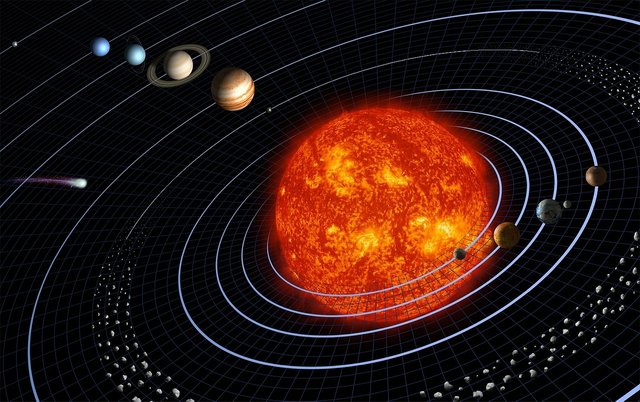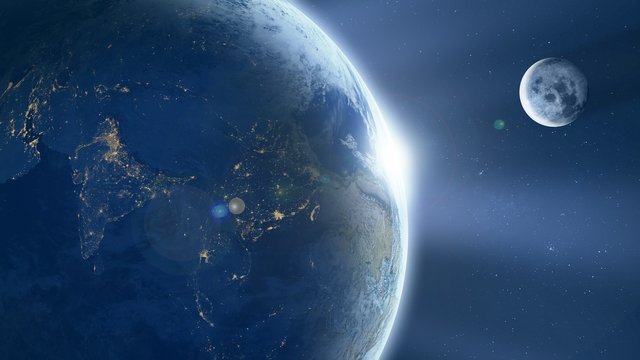The Amazing Solar System and our Planet
This was originally posted yesterday at whaleshares.io don't miss to visit it and create an account there!
Nowadays many people strongly believe that earth is flat, a flat floating disc with icy borders.
The conspiracies about evil governments, that hiding the truth from humanity (for unknown reasons) multiplying day by day thanks to YouTube, and people instead of reading a and learn, just accepting whatever they see without filtering it and searching more about it.
I'm a person that strongly believes in science, that's why this article was written with facts scientific approved, and it's not a try to convince anybody.
So according to Wikipedia :
The Solar System is the gravitationally bound planetary system of the Sun and the objects that orbit it, either directly or indirectly.

Our solar system is located in the Orion arm, 25.000 to 28.000 light-years from the center of Milky way galaxy, and it needs 225 to 250 million years to complete one revolution (galactic year) moving with speed of 220 km/h.
With age around 4.6 billion years it formed from the gravitational collapse of a giant interstellar molecular cloud.
As middle-aged start, our sun it has more or less around 5 billion years until transform into red giant, expand its size and swallow the planets that orbit him. It will continue expand for 100 million years until it can no longer produce energy, transform into white dwarf, and die as cold planet.
Right now our Sun contains 99.86% of the system's known mass and dominates it gravitationally, and it's orbited by eight planets that form our planetary system. Four smaller inner planets, Mercury, Venus, Mars and including Earth, are terrestrial planets being primarily composed of rock and metal. And the four outer planets are giants, two air giants, Jupiter and Saturn being composed mainly of hydrogen and helium, and two icy giants Uranus and Neptune being composed mostly with water, ammonia and methane. All the planets except Mercury and Venus, has natural satellites called moons.
The Solar System also contains smaller objects, such as dwarf planets like Pluto and Eris, asteroids like Ceres, comets, centaurs and interplanetary dust clouds.
From Babylonians and ancient Greeks, there is many observations and theories about planets, with the oldest one being the planetary astronomical text the Babylonian Venus tablet of Ammisaduqa.
Also the 3rd century BC Aristarchus of Samos proposed a heliocentric planetary system, according to which Earth and the planets revolved around the Sun.

Earth is the only planet in our Solar system, that has seas (something that was supported earlier about Venus and until recently for Saturnal of Saturn, Titana), the only one with a strong geological activity and the only place (as well as we know to date) hosting life. The atmosphere is consider mostly nitrogen and oxygen, and is the largest and densest of the inner planets. It is also the first, from the sun, planet who has a natural satellite, the moon.
A planet is an astronomical body orbiting a star or stellar remnant.
- is massive enough to be rounded by its own gravity
- is not massive enough to cause thermonuclear fusion
- and has cleared its neighbouring region of planetesimals
There's a lot more than this, for someone who wants to learn about it. Just keep in mind the fact, that even the ancients has observations of planets, theories about heliocentric systems and even mathematical schemes for predicting the positions of the planets.
Sources:
https://en.m.wikipedia.org/wiki/Solar_System
https://en.m.wikipedia.org/wiki/Planet
Sponsored ( Powered by dclick )
How to trade bitcoin futures and options with Deribit.
Deribit is an Amsterdam based crypto derivatives exc...
Hi @cryptomaniacsgr!
Your post was upvoted by @steem-ua, new Steem dApp, using UserAuthority for algorithmic post curation!
Your UA account score is currently 2.031 which ranks you at #25451 across all Steem accounts.
Your rank has dropped 1 places in the last three days (old rank 25450).
In our last Algorithmic Curation Round, consisting of 189 contributions, your post is ranked at #179.
Evaluation of your UA score:
Feel free to join our @steem-ua Discord server